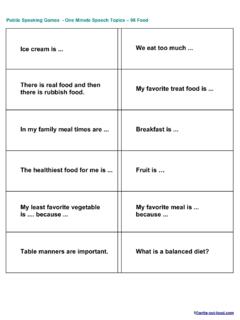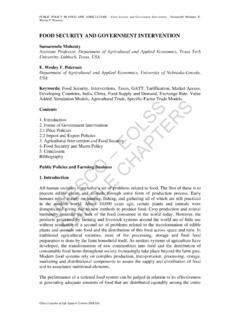Transcription of Public-Private Partnerships Improving the San Francisco ...
1 SAN Francisco MEDICINE APRIL 2007. Public-Private Partnerships Improving the San Francisco food System By Paula Jones and Rajiv Bhatia, MD, MPH. Like many urban centers, San Francisco faces significant challenges to creating and maintaining a healthy food system for all residents. Hunger and food insecurity are on the rise, and there is an ever-growing demand for food pantries and other forms of emergency food assistance. At the same time, the overabundance of cheap food of low nutritional quality contributes to an epidemic of obesity, diabetes, and other diet-related diseases. San Francisco takes pride in its high-quality and ethnically diverse restaurants, but many residents also lack affordable, healthy food options in their own neighborhoods.
2 With federal and state budgets tightening, San Francisco risks cuts to crucial federal nutrition programs that serve our most vulnerable residents. Additionally, our food choices have resulted in environmental issues, including air and water pollution from food production, distribution, and processing; pesticide exposure; hazards to farm workers; and the loss of California's farm lands. San Franciscans recognize that all these food issues are linked together and that they are significant for public health, social justice, and ecological sustainability. These problems also require working across traditional sectors, using systems-based approach. As a result, many government agencies, community-based organizations, residents, and businesses are now aiming to harness their collective power to find multiobjective solutions at every potential level of action.
3 In 2005, in an action consistent with this systems approach, the San Francisco food Alliance published the San Francisco Collaborative food System Assessment to provide a baseline picture of San Francisco 's food system that includes retailers, distributors, federal nutrition programs, community gardens, school gardens, farmers markets, and regional agriculture. food systems actors are working together through a diverse array of other collaborations, such as the San Francisco Unified School District Student Nutrition and Physical Activity Committee, the Board of Supervisor's food Security Task Force, the Green Schoolyard Alliance, and the Shape Up Coalition. One key goal shared by many food systems stakeholders has been to increase the amount and quality of food resources for the city's most vulnerable families.
4 For example, approximately 40,000 San Franciscans are eligible for but not enrolled in the food Stamp Program the most widely used federal nutrition support program. Last fall, the San Francisco Human Service Agency, working in conjunction with the food Security Task Force, was awarded $1 million by the USDA to improve food stamp access in San Francisco . San Francisco food Systems, in partnership with the San Francisco Department of public Health (SFDPH) Human Service Agency, worked with local farmer's markets to implement systems to ensure that low-income San Franciscans can use their food stamp benefits at San Francisco 's farmer's markets. Another priority focus area has been the quality of food in public schools.
5 In 2003, SFUSD's Student Nutrition and Physical Activity Committee developed a nutrition policy that included high-priority pilot programs aimed at Improving the utilization and quality of the school meal program. SFUSD, with the support of several committee members, has subsequently piloted many innovative programs, including the Grab 'n' Go breakfast and daily offerings of fruit bars, and it has developed a model Wellness Policy. Through a partnership with The Fruit Guys, a locally owned produce company, SFUSD. students have had access to organic and sustainably produced fruit through the school breakfast and lunch program. In 2006, SFUSD won the Congressional Victory against Hunger Award for its work to improve school meals.
6 The Department of Children, Youth and their Families (DCYF) has also provided leadership to ensure that during the summer months, San Francisco 's school children have healthy meals in their neighborhoods. During the school year, approximately 21,000. school children eat free lunches at school, while during the summer months, only about 5,000 children participate in the federally sponsored Summer food Service Program operated through neighborhood organizations. DCYF, along with the San Francisco food Bank and many other community partners, has focused on three areas: enlisting more neighborhood organizations to participate, developing marketing information to inform parents, and including more varieties of summer fruit in the program.
7 Work to provide healthier food resources at the neighborhood level has also enlisted small businesses. The Good Neighbor Project in Bayview Hunters Point is a collective effort by Literacy for Environmental Justice, the SFDPH, the Department of the Environment, and the Mayor's Office of Economic Development, joining with San Francisco Community Power, Rainbow Grocery, and the San Francisco Produce Terminal. This collective has worked to support small business by providing the necessary refrigeration, in-store marketing materials, and branding to encourage shoppers to purchase healthier foods. There are now several Good Neighbor merchants in Bayview, including SuperSave and the Bayview Hunters Point Farmer's Market.
8 In 2006, Assemblymember Mark Leno used these programs as models in legislation that created a statewide Healthy Purchase pilot program to give corner store owners in low-income areas assistance in providing fresh fruits and vegetables to their customers. The focus on vulnerable populations, schools, and neighborhoods is now trickling up to city level. An example of a citywide food systems action is the 2006 Sustainable food Policy by San Francisco Department of public Health. This policy requires SFDPH to increase the amount of local, sustainable foods offered by contractors and served in the public hospitals and at department events. This SFDPH policy will ultimately serve as the foundation for a citywide sustainable- food purchasing policy.
9 Other citywide strategies to improve our food system will require attention to land-use planning, in order to support neighborhood supermarkets and community gardens, and to fiscal mechanisms to support healthy choices. There is no shortage of ideas, and San Francisco is an ideal environment to support experimentation and innovation. Support for San Francisco 's local efforts and more long-lasting changes in regional and nationwide food systems also requires attention to federal policy. For example, the 2007. Farm Bill authorizes hundreds of billions of dollars in spending and affects the quality of food in every city. Fortunately, the broad participation in food systems efforts has led to awareness on the part of City leaders of the impact of federal policy, and San Francisco has begun advocating for changes in the Farm Bill.
10 These efforts call on the federal government to protect and enhance federal nutrition programs, support regional fruit and vegetable growers, and support ecologically sustainable farming practices. Establishing a coherent and healthy food system in a global economy is a daunting task, but effective solutions can be found by working across sectors with government agencies, community organizations, and businesses. Using a food systems approach, we hope San Francisco will help point the way forward. Paula Jones is the Director of San Francisco food Systems with the SFDPH and Rajiv Bhatia, MD, MPH, is the Director of Occupational and Environmental Health with the SFDPH.






